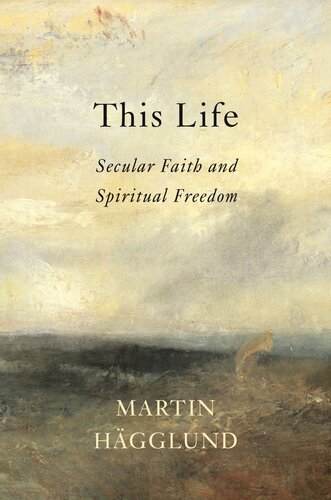
This Life
Secular Faith and Spiritual Freedom
کتاب های مرتبط
- اطلاعات
- نقد و بررسی
- دیدگاه کاربران
نقد و بررسی

December 1, 2018
A defense of democratic socialism, grounded in religion, philosophy, economics, and literature.In a densely argued critique of religion and capitalism, philosopher Hägglund (Comparative Literature and Humanities/Yale Univ.; Dying for Time: Proust, Woolf, Nabokov, 2012, etc.) tackles thorny questions of value, freedom, and responsibility. Analyzing a wide range of thinkers--among others, Aristotle, Spinoza, Kierkegaard, Hegel, Marx, Martin Luther King Jr., John Rawls, Friedrich Hayek, and Thomas Piketty--Hägglund asserts that only secular faith and democratic socialism can "provide the institutional, political, and material conditions for spiritual freedom." In the first part of the book, the author examines the social and moral consequences of belief in eternity, which he sees as central to religious faith. Believing that one's soul transcends time leads to indifference to worldly events, immunity from grief or loss, and lack of care about the fates of others. God, Hägglund writes, "is completely irresponsible because he is not bound to anything other than himself." Secular faith, on the other hand, is premised on an individual's sense of moral responsibility and investment "in finite lives." Personal attachments leave individuals open to suffering, but they offer "a positive chance of having a relation to others" and to developing and acting upon "an existential commitment--to a political transformation, a filial relation, an artistic creation, and so on." The second part of the book focuses on an intensive examination of capitalism, which the author argues necessarily undermines individuals' spiritual freedom and generates political and economic inequality. Neither a universal basic income nor redistribution of wealth "can free us from capitalist exploitation," he asserts, "since only wage labor in the service of profit" supports the accumulation of wealth that fuels "the dynamic of capitalism." In order "for democracy to be true to its own concept of freedom and equality," he writes, "capitalism must therefore be overcome." Freedom to act authentically, to make choices that support the common good, and to enhance the quality of our free time is fundamental to Hägglund's argument in favor of democratic socialism.An impassioned and erudite proposal for vast systemic changes.
COPYRIGHT(2018) Kirkus Reviews, ALL RIGHTS RESERVED.

February 1, 2019
Evaluating works by diverse thinkers such as C.S. Lewis, Karl Ove Knausgård, and S ren Kierkegaard, Hägglund (comparative literature and humanities, Yale) argues that only a secular faith recognizes that life is truly precious and can motivate human striving to make the world what it can be. This life is all there is, and religion--any belief that there is something for humans beyond the present life--gets it wrong and undermines the spiritual value of human determination to turn existence into something of value. The second half of the book addresses how humans can live together in a more fulfilling way: drawing on a humanist reading of Karl Marx and Georg Hegel, Hägglund emphasizes the desire and necessity for democratic socialism as the path toward spiritual freedom. Although the book has a compelling unity, religious readers willing to try it will find themselves saying, "yes, but...," while secular readers will stumble over the author's detailed attention to religious thinkers. Both would do well to engage Hägglund, turn toward listening to each other (even where agreement is elusive), and join in making the world a better place. VERDICT Highly recommended for philosophically and theologically minded readers.--Steve Young, McHenry Cty. Coll., Crystal Lake, IL
Copyright 2019 Library Journal, LLC Used with permission.

Starred review from February 15, 2019
Philosopher H�gglund says the problem with faith in God and eternal life is that it is impossible by the definitions of God and eternity. God is perfect and unknowable, beyond the needs and the ken of the imperfect, knowledge-seeking beings that humans are. Eternity is timeless and as such unimaginable by time-bound beings. All that humans can have faith in is living and what can be accomplished by mortal beings. The only faith one can have is secular. Further, that secular faith is for each person a function of spiritual freedom, by means of which each chooses purposes and motivations. Life lived according to secular spiritual freedom, H�gglund says, is most realizable by returning to Marx's social insights, especially his call for a revaluation of social-economic value?a call to which he failed to give substance. That revaluation, H�gglund proposes, should shift the measure of economic value from wage labor to creative personal time; the social-economic prime objective then becomes maximizing individual vocational freedom rather than financial profit?benefit for all rather than primarily for capitalists. There is quite a bit more to this book that both draws on and critiques such major thinkers as Aristotle, Augustine, Kierkegaard, Marx, Hegel, Keynes, Hayek, Adorno, and Martin Luther King Jr.?without ever bogging down in philosophical jargon. As timely as a work of philosophy could be these days.(Reprinted with permission of Booklist, copyright 2019, American Library Association.)

























دیدگاه کاربران